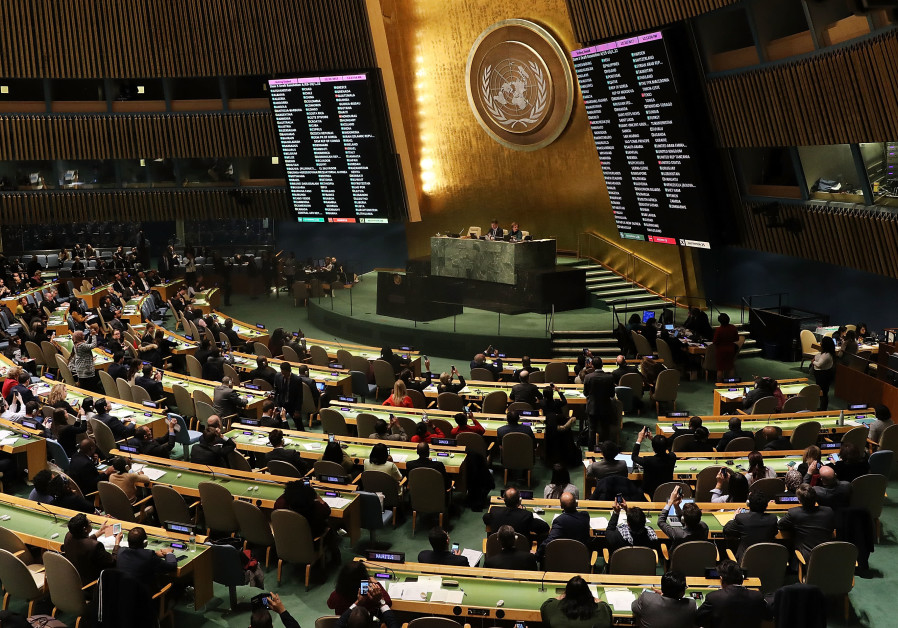ANALYSIS: Disappointment at the UN, but also a few pleasant surprises

The voting results are displayed on the floor of the United Nations General Assembly in which the United States declaration of Jerusalem as Israel’s capital was declared “null and void” on December 21, 2017 in New York City.. (photo credit: SPENCER PLATT / GETTY IMAGES NORTH AMERICA / GETTY IMAGES/AFP)
The United Nations is generally a source of grief and disappointment for Israel, and Wednesday’s vote in the General Assembly on motions having to do with the recent violence in Gaza was overall no exception.
A non-binding resolution in favor of international protection for the Palestinians passed resoundingly, while a US-backed amendment to that resolution condemning Hamas violence failed to muster the necessary two-thirds majority to be adopted.
But there was something very different about Wednesday’s dramatic General Assembly proceedings: They did not only hold disappointment for Israel, but held as well some pleasant surprises.
Since pleasant surprises at the UN for Israel are rare, it seems only right to begin with them.
One of the biggest surprises is that a motion by Algeria to quash the US amendment condemning Hamas violence failed. In other words, Israel actually won a vote by a tally of 78 against quashing the amendment, 59 in favor and 26 abstentions.
And this was followed by a vote on the resolution itself, which actually passed by a vote of 62-58, with 42 abstentions. That means that a plurality of the countries were in favor of a resolution condemning Hamas. Because of the procedural necessity for a two-thirds majority, this amendment was not adopted. But that it was even presented, and then passed by a plurality, is a change.
Israel could also take some satisfaction in the fact that all 28 EU countries voted for the US amendment.
And now to the disappointments.
The first disappointment was that the US amendment did not muster a two-thirds majority.
The second disappointment was that an appeal by the US against the need for a two-thirds majority was voted down. And the biggest disappointment – though it was expected – was that the anti-Israel resolution calling for protection of the Palestinian people passed by a huge majority.
When looking at how individual countries voted, the biggest disappointment has to be Africa, where all but eight African countries voted against Israel, including countries such as Kenya and Uganda, where Prime Minister Benjamin Netanyahu has visited over the last two years.
Netanyahu has expended a great deal of time and energy improving ties with Africa, and one of his expectations is that Africa stop automatically voting for the Palestinians in the UN. That hope did not materialize on Wednesday. Only Togo voted for Israel, while only South Sudan, Malawi, Ethiopia, Cameroon, Liberia, Ghana and Rwanda abstained.
Another country that disappointed in the final vote was India, which voted against Israel on the final resolution. The good news regarding India, however, is that it voted for Israel against the Algerian move to quash the US amendment, and then abstained on the two other votes. Before Indian Prime Minister Narendra Modi took power in 2014, India could have been expected to vote against Israel on all the motions.
Another major disappointment was Greece, which was one of the 12 EU countries to vote for the anti-Israeli resolution – this despite declarations over the last three years of an emerging alliance in the eastern Mediterranean between Israel, Greece and Cyprus. Cyprus abstained.
A look at how the EU states voted shows a deep fissure regarding Israel among the 28 countries, as 12 voted for the resolution, and another 16 abstained. The EU aims for a consensus on international issues, but when it comes to Israel, this is very elusive.
Greece was the only real surprise among the EU countries voting against Israel, with a clear pattern of “the usual suspects” emerging regarding the EU countries that now consistently vote against the Jewish state: France, Spain, Sweden, Ireland, Belgium, Slovenia, Malta and Luxembourg.
In the other column are those countries which Jerusalem can count on to at least abstain in these types of votes: Croatia, the Czech Republic, Hungary, Latvia, Poland, Romania, Bulgaria, Lithuania and Slovakia. This group was augmented this time by countries whose votes on Israel vary from issue to issue, such as Germany, the United Kingdom, Denmark, Italy, Austria and the Netherlands.





Comments are closed.